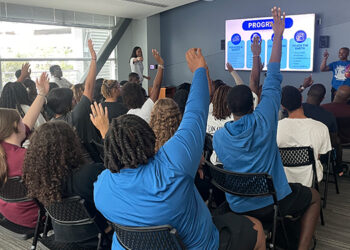Fitness programs, staff members and equipment are just some of the many components that make up a functioning campus recreation department. And while unique in several ways, each shares one distinct quality: They all cost money. And to manage those costs, you need a budget.
Budgeting is the road map for how much money you will spend in the upcoming year, and this practice is a cornerstone of every campus recreation department. It’s the way you ensure you stay in the black — or as close to it as possible — each year.
To provide some tips for budgeting, we spoke with two associate directors at Northeastern University in Boston: Omar Rouhana, the associate director of campus recreation — business and technology, and Pamela Wetherbee-Metcalf, the senior associate athletic director.
CR: Describe some of the best practices for budgeting for the upcoming school year.
OR: We create detailed budgeting, forecasting and planning models by following the F.A.S.T. model:
- Forecast your employee staffing model, and assign a budget amount to it, considering all ebbs and flows of the fiscal year.
- Allocate to each unit head a budget for the year, based on standard operating hours and programming hours. Each unit head should be expected to submit monthly reports and identify concerns in advance. Accountability to budget standards are of paramount importance for all employees with budget responsibilities.
- Scrutinize purchases related to operational expense allocations by unit, as well as weekly payroll overdraft by each unit.
- Track and ensure each unit within the department adheres to the assigned budget. Bring discrepancies to light in a timely manner.
CR: Are there any areas of the budget you should prioritize more than others?
PWM: Staffing — facility hours and programming — staff training and equipment/operational expenses will be the greatest areas of need. The department should have a pre-established staffing model, and as such, know the required allocated budget to end the year in the black. The staffing model should be designed to reduce areas and timeframes with too much staff, and areas where supervision should be greater and adjust staff and funds accordingly. This will help eliminate wasteful spending.
Utilize federal work-study funds as much as possible. Based on past expenses and any new entries and space availability, your budget managers can forecast future programming payroll. It’s important to also keep in mind merit increases, changes to the minimum wage and federal work-study award changes will almost always affect your budget forecast.
Cardio and strength equipment upgrades should be part of a capital equipment replacement plan on a 10-year minimum cycle, depending on the type of equipment and the volume of use. Towels and other expendable items, such as sports and fitness equipment, that typically experience significant wear and tear should be on a semester cycle — or more often — for replacement.
CR: What are some creative ways you can save money year to year?
OR: Here are some of the things we do:
- Before you purchase anything, research if it can be found for no cost. Maybe check in with the university surplus warehouse.
- Advertise open positions through free websites.
- Arrange your conference travel well in advance, saving considerably on hotel and airline costs.
- Ensure your staff procurement specialist is trained on bidding and securing the best possible prices for goods and services through a large variety of vendors.
- Re-evaluate your paid subscriptions and seek donations from membership through a re-purposing approach to their subscriptions.
- Consider daily operations for equipment check-out and laundry — is it more expensive to hand items out over and over by paid personnel, or allow for a certain amount of loss each semester by placing items on the floor for access.
- Buy in bulk, partnering with other university departments for items such as towels.
- Partner with student affairs on your campus regarding common needs such as software trainings and speakers for team development.
- Inventories and systems for daily operations to ensure loss of expensive items are managed, as in have check-out procedures.
CR: Any other tips for budgeting?
PWM: We follow these simple rules:
- Capital and strategic planning for the department is necessary.
- Know your budget inside and out.
- Track your spending continuously and hold others on staff accountable to the same.
- Prepare for the unexpected by having a contingency in place.
Set a commitment in your department to always find ways to save.










